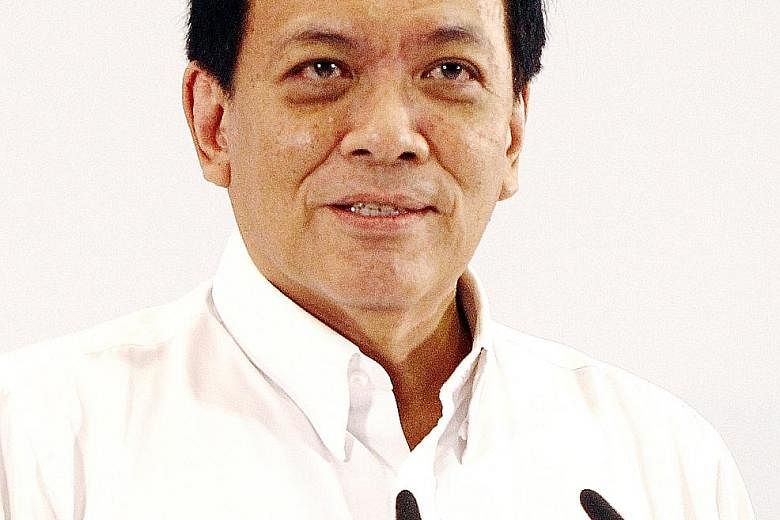The pain and problems of handing over a town council when constituencies change hands between political parties after an election will be reduced, under a new law passed in Parliament yesterday.
The amended Town Councils Act will let the Minister for National Development set out rules for post-election transfers, including ordering the outgoing town council to provide financial accounts information to the incoming team.
"A smooth changeover of town councils ensures continuity in services to residents," Senior Minister of State for National Development Desmond Lee said yesterday as he wrapped up the debate on the Town Councils (Amendment) Bill.
The changes give legal teeth to guidelines on handovers found in a guidebook drawn up by the National Development Ministry in 2013 and circulated before the 2015 General Election, Mr Lee added.
-
Key changes to Town Councils Act
-
1 Audited financial reports must be submitted within six months of the financial year's end. Town councils must also publish them openly. Those which persistently fail to submit their accounts on time can be fined not more than $5,000.
2 Town councils must notify the public and the Ministry of National Development of changes to key personnel, such as chairman, general manager or finance manager, within 30 days. They must put up notices in the estate and online. Currently, they need to publish a notice only in the Government Gazette on the changes "as soon as it is practicable".
3 Town councillors, committee members, town council staff, or anyone delegated with responsibilities must declare conflicts of interest. The town council secretary is to keep a register of all such disclosures. If he does not, he can be fined not more than $5,000.
4 The ministry can take investigative and enforcement action in the case of potential regulatory breaches or systemic weaknesses in a town council. It may conduct periodic compliance reviews, and issue orders for remedial action, among other things. As a last resort, the minister may put the town council under "official management" - this means all town council members are suspended from office unless otherwise indicated - if the "health or safety of the residents is under threat".
5 Easier handover of town councils between political parties after elections. The minister can set rules, like ordering a town council to give information to the party taking over.
6 Town councils must set up a Lift Replacement Fund for lift-related replacement and upgrading works. More details, such as minimum contribution rates, will be set out in subsidiary legislation.
He was replying to Dr Teo Ho Pin (Bukit Panjang) and Mr Zainal Sapari (Pasir Ris-Punggol GRC), who had asked for clear rules and procedures as well as a deadline to be set for town councils to comply with in a handover.
Mr Zainal, in calling for greater guidance, crossed swords with four Workers' Party MPs - Mr Low Thia Khiang, Ms Sylvia Lim and Mr Pritam Singh (Aljunied GRC) as well as Mr Png Eng Huat (Hougang) - when he dwelt at length on obstacles in the handover of single-seat Punggol East. The People's Action Party (PAP) lost the constituency to the WP in a by-election in January 2013 but wrested it back in the 2015 General Election.
The constituency's management then shifted from the WP-run Aljunied-Hougang Town Council (AHTC) to the PAP's Pasir Ris-Punggol Town Council (PRPTC).
Mr Zainal, chairman of PRPTC, lamented: "It was unfortunate the poor practices and failure of compliance by AHTC then 'contaminated' the entire set of accounts for the whole of PRPTC, through no fault of our own."
Mr Singh, the chairman of AHTC, countered that Mr Zainal could have raised the matter with him but chose not to. Ms Lim and Mr Low bristled at his reference to an auditor's report on the AHTC.
Last November, independent auditors KPMG identified "systemic difficulties" when it reviewed the town council's books.
But was there a finding of criminal intent in the report? asked Mr Low and Ms Lim.
Each time, Mr Zainal said it was a matter for the authorities to decide.
Mr Lee and House Speaker Halimah Yacob put a stop to the arguments, saying the debate was on the principles of the Bill and not the details of specific cases.
Weighing in, Mr Charles Chong (Punggol East) accused the WP of dragging its feet on the handover, saying: "The Government will be remiss in its duty to Singaporeans if it allowed what happened to Punggol East to ever happen again."
But the key to a "seamless transition" is the willingness of both sides to cooperate on the transfer of assets and information, said Mr Lee.
He also said the law has been kept broad to give the parties room to resolve issues. "Not every detail can be anticipated," he added.
He said the ministry will step in if there are irreconcilable differences of opinion.
In an impasse, the minister "can require an outgoing town council to furnish the necessary information" to the incoming team, he added.



